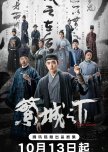
well written + well acted = highly entertaining
If you're tired of the giant, mediocre celebrity machine, Ripe Town (or Under the Prosperous City) is a breath of fresh air. Qu Sangeng is a bailiff in the very early 1600's whose revered master is murdered as the start of a chain, leading him to re-investigate a 20 year old buried case of a mass murder of an entire wealthy family. With only a handful of trusted friends close to him, he battles not only gang leaders and hostile witnesses, but also hostile superiors and his own fellow bailiffs, in his discovery of shocking truths. The concept of justice gets blurred in a world of revenge, where very few have come by their successes honestly. Sangeng is smart and bold, but too naive to recognize what he's not able to control.Comparisons to A League of Noblemen came to mind as I started watching, but Ripe Town is more down to earth. It's only 12 eps long so there's no wasted time. However, many characters were introduced quickly, and flashbacks often were presented without warning, so it was hard to connect people and events until much later in the show. This isn't necessarily a bad thing; it made me pay closer attention to keep pace, and by the end it all comes together. I'm not familiar with the classical reference, Analects of Confucius, which is a major focus of the hunt for the serial killer, so I won't comment on its role in the story. But, I am one for whom a music score greatly affects my engagement with a show, and this show had interesting drum rhythms similar to that of A League of Nobleman (which featured an intriguing drum solo for its entire opening theme). It perfectly complemented an exciting chase scene as the Hunter Squad takes down a monkey demon thief on the run.
The acting was very good and I was especially impressed with the performance of 16 year old Yu Yao. Yu's role is listed as a support role, but so much time is spent on his character's backstory that he should be considered the 2nd lead. He was able to portray someone of high intelligence, and cunning, with surprising maturity. All of the young teenage characters are subdued, which adds to the ominous atmosphere of the story. Yu is definitely one to watch for in the future.
The story is not a bromance, which seems to be the going popular theme, but is still very male-centric. There was even a poke at the trope of females disguising themselves as males by simply wearing male attire. While this inexplicably works in too many shows, it's flat out rejected in Ripe Town in an amusing scene.
I wish more shows would have this level of writing, that challenge your assumptions of who is good or bad, your expectations of a main character as hero, as well as your ability to predict what will happen next. The scenes were beautifully shot, no sloppy editing, and the 12 ep length made for a nice, tight story. Overall, it was one of the more entertaining shows I've seen this year.
Cet avis était-il utile?

a perfect marriage of history & drama
This review is only for Part 1 (Ep 1-10)Having grown up in North America, I know next to nothing of Chinese & Asian history. This K-period drama has sparked my curiosity about ancient China's profound economic, political, & cultural influence on Korean history. The show balances interwoven love triangles, set against the tumultuous backdrop of the 1637 Qing invasion by a transitioning China. Korea is caught in the crossfire between two Chinese dynasties, the declining Ming & rising Qing.
The central character is a young noblewoman, Yu Gil Chae, who lives in a college town filled with scholarly noble families. She, along with her peers, is concerned only with finding the right husband. Problem is, she loves her best friend's betrothed who doesn't return the affection. As the spectre of a devastating war looms, a mysterious nobleman, Lee Jang Hyun, comes into town to do business, who seems completely noncommital & almost contemptuous in both personal relationships as well as politics. He justifiably criticizes a weak and paranoid king. However, willingly or not, he becomes a key player in the fate of the townspeople, the country, & Gil Chae's destiny.
The romance portion starts off light in tone, whereas the war is given a very stark & brutal picture. The barbarian coalition of Manchus, Mongols, & Chinese forces are literally blood thirsty. Interestingly, the Manchu language, which is now in danger of extinction, is preserved in this drama with the actors actually having had to learn & speak lines of it. For the first half, it seemed like this show would be a more serious war drama with a light romance on the side which didn't really seem to fit. There's the usual trope of the bad start relationship, & Gil Chae's devotion to her unrequited love interest got rather annoying.
However, in the 2nd half of Season 1, the war ends with the subjugation of the Joseon king, & the relationship between Gil Chae & Jang Hyun, as well as the rest of the characters, gets really interesting. The war divides Joseon into 2 types of people: those who place counry & duty above all else & those who don't. This is oversimplification but it's the basis of all the interpersonal conflicts. I liked Ahn Eun Jin's amazing portrayal of Gil Chae's growth from a naive girl into a self determined woman. I was completely sucked in watching the push & pull of Gil Chae & Jang Hyun's relationship as they try to figure out what they want from each other & for themselves. The emotional level is on par with The Red Sleeve. Gil Chae makes a gut wrenching but true-to-self decision at the end & this is the lead in to Season 2. Definitely must watch to the finish!
Cet avis était-il utile?

La Légende de Shen Li
2 personnes ont trouvé cette critique utile
masterful performances & strong start but couldn't fill up all 39 eps
I didn't know what to expect from this show but it quickly became a delight after the first couple of episodes.Shen Li is the demon Azure Sky King, who flees from a forced marriage down to the mortal realm. There, while injured & helpless in her original bird form, she meets XingYun, a ginseng farmer living alone in near poverty, and who happens to also be the mortal manifestation of a sleeping ancient god XingZhi.
"I'm not stupid!" proclaims ShenLi at one point & indeed, she is not. She is a demon military commander who is revered not only by her army but also the citizenry she protects. She's also no-nonsense to a fault, empathetic only to those closest to her. However, the irreverent XingYun unbalances her as the first man she has ever had to depend upon with her life, & as a sickly weak mortal at that. She's drawn to him in spite of him always teasing her & never actually inviting her closer. The back & forth between the two is subtle & handled so skillfully by the veteran leads that you don't recognize the trope until it's already done. And it's very funny.
I've only seen Zhao Li Ying in The Story of Xing Fu which was a fantastic show. Her maturity lends to her strength & consistency in her performance & she's become someone I look forward to watching. Lin GengXin as XingYun/XingZhi was remarkable in maintaining a core personality between 2 different manifestations of the same character. He Yu as Lord FuRong, ShenLi's original betrothed, took a few episodes to find his footing in the role, but as the show progressed he turned into one of the funnier characters, even becoming likeable, alongside the ever entertaining Jackie Li.
All of this made for such a strong first half of the show that I was ready to give it one of my highest ratings. However, past Ep20, the pacing suddenly lagged & the story meandered for 6 or7 eps. Then came the backstory of ShenLi's origins & the late introduction of a new character, ShenLi's father. However, their reunion was puzzlingly brief & they didn't even hold a satisfactory conversation together. After such smart dialogue in the first half of the show, it made no sense that ShenLi couldn't say one word to her father when this was such a huge development. It seemed illogical with her character to not even make herself known to him when he was right in front of her, & he had to find out who she was from someone else.
The climactic battle to suppress a superdemonic foe & stabilize the universe was a cliched, long CGI light show. In fact, a lot of detail & effort was put into visually creating the fantastical realms but the heart of the characters, dialogue & story were significantly diminished. By that time I had no interest in the good vs evil routine. I just wanted to see what outcome ShenLi & XingZhi's relationship would face. Their fate ultimately held no surprises, secondary character arcs were left dangling (would've liked to see more FuRong/YouLan), & the story really ends with Ep38. Ep39 ran like someone forgot there was 1 ep left to go & had to slap together whatever story was left at the top of their head, which wasn't much. Why didn't the show just save some money & skip it? It could've been a 30 ep show with what story was presented.
After such a strong start it seemed this would be a very different kind of drama but the 2nd half unfortunately face-planted into a puddle of mediocre. So wildly inconsistent I truly can't decide whether I liked this show or not. I loved the first half; second half not so much.
Cet avis était-il utile?
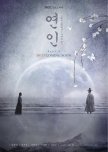
Lost steam from Part 1, but still a worthy watch
After a heart-breaking finish to Season 1, the story turns once again to the Qing invasion and the atrocities committed in the aftermath on a chaotic, fractured, and helpless Joseon. Only the efforts of officials and people on the ground like Jang Hyun, working with the hostage Crown Prince, are tenuously holding the country together. Despite the horrific suffering of Joseon prisoners of war, Gil Chae manages to rebuild some of the comfortable lifestyle she was accustomed to but is shockingly reminded that class is meaningless in an oppressed state. There are also stark reminders of how women are truly expendible victims. I was waiting to see what choices the characters made when pushed to extremes and this season had some of the most riveting scenes. The tone was lightened at times with romantic tropes (pretending to be sick to get attention) which seemed out of place in a drama of this caliber.At around Ep15 I suddenly remembered the opening scene of Ep1 which takes place more than 20 years after the 1637 invasion. It was worth a re-watch to find hints at a very tragic conclusion for our heroes. The announcement of an extension came after Ep8 aired and I wondered if there would be a hopeful epilogue. Unfortuately, after Ep20 the Ep1 opening sequence was not yet reached in the story and I was left wondering if the extension had already been inserted. There was no added value to Eps 19&20 and they could easily have been combined into one. Ep1 is recapped in the finale, Ep21.
At times throughout the drama I kept feeling a disconnect between Gil Chae and Jang Hyun's relationship and their surroundings, like I was watching 2 separate shows. Political events deeply affected each of them separately and this was infused into how they dealt with each other during Part 1. However, that influence seemed less evident in Part 2 even though the political pressures never went away. They lived and worked separately for so long that there wasn't much that they actually did for/with each other. It was as if Eps19/20 were there just to make up for their separation, more couple less story, and I felt the show lost momentum at this point as all the other characters got moved to the sidelines. However, the finale felt right once more as loose ends got tied up.
All in all, the acting was among the strongest I've seen in any show (I still think The Red Sleeve's demented king was an acting masterclass). Although Part 2 seemed to run out of steam in the 2nd half, the strong production, story telling, and deep dives into the human psyche makes this show worth watching.
Cet avis était-il utile?
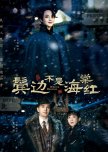
Le Bégonia de l'Hiver
2 personnes ont trouvé cette critique utile
a gem of a show, if you have the patience
I almost dropped this show after 6 eps, not because it was bad, but because the pacing was so slow I didn't think I was in the mood. There's a strong 1930's feel in the whole production. The mostly static camera work makes it feel like watching a stage play or an old black & white movie. The music score and the slightly over-the-top Classical Hollywood style acting all combine to produce a complete 1930's vibe. This old-movie style isn't to my taste, but eventually I appreciated the strong performances from all the cast. I recognized many cast that were also in Arsenal Military Academy & Court Lady, & I feel some of the musical score was reused in all 3 shows; it all sounded so similar. In fact, these 3 shows share the same directors.Shang Xi Rui is an opera singer specializing in dan (femaie) roles. He's a naive & eccentric prima dona. But when the troupe hits hard times, he pulls through to lead with compassion, humility, & sincerity (in between the prima dona tantrums). He remains true to his art & his genius as he inspires & motivates his troupe to become the leading opera troupe in Beiping. I'm sure the singing is dubbed but Yin Zheng's mannerisms while in full opera costume are very impressive & he very deftly portrays SXR's growth & setbacks as he encouters new hardships without losing his core values.
2nd Master Cheng FengTai becomes SXR's friend & benefactor after SXR's performance awakens a hidden passion for opera. No idle aristocrat, he actively runs a distribution business (including weapons) & organizes culteral preservation projects. He tries to maintain his marriage by never arguing with his unacknowledged wife, which only feeds her insecurity. Ultimately, she comes through as the backbone of the family. The Cheng household is a busy one with many extended family members connecting 2nd Master to a huge network of government & military officials. This network provides the infrastructure for the complex interplay of family, politics, art, & war throughout the drama. Also, many characters aren't what they seem.
Since watching Lost You Forever S1 I've become a Tan JianCi fan & he was actually the reason I started this show (I didn't realize he was also in Court Lady!). But if you watch just for him, he won't show until Ep11 & is present in fewer than 10 eps. His role may have been very small, but his acting talent is equal to the rest.
Although this show isn't completely my cup of tea, what kept me watching was the character of SXR: intelligent, self-centred but with a heart of gold at the same time, how he could push through the strict boundaries of his art & be successful. The cast was very good at portraying multi-dimensional characters. I also liked the glimpse into the world of Beijing opera & I'm now curious about the stories & what makes a good performance. However, the pacing was either slow or slower, with loose ends left at the end in spite of all the time it took to get there.
Cet avis était-il utile?

Le Meilleur des Choix
1 personnes ont trouvé cette critique utile
Outlandish family antics makes a cringeworthy watch
I felt that by watching this show I would give Xu Kai & Yang Zi one more chance before I give up on using them as the primary reason to watch any of their shows. And how lucky that I can watch them both in one show before making my decision. I have enjoyed past shows starring each of them, but the enjoyment was due more to the power of the story & production, rather than their performances.Best Choice Ever is another rich/poor CEO/employee set up in Shanghai. Yang Zi plays 29 year old Mai Chenghuan, a senior employee in the sales department of a luxury hotel. Xu Kai plays Yao Zhiming, the newly arrived, foreign educated, CEO of said hotel, of course. MCH is already in a tenuous 3 yr relationship with the son of a large design company, & of course gets off to a bad start with her new boss.
MCH's engagement to the future successor to a large business partner of the hotel she works at poses the ultimate conflict of interest as both businesses seek to use the upcoming marriage as leverage for their financial deals. The conflicts of interest don't just stop there. The drama presents a lawyer representing his girlfriend, & using work resources for personal issues while proclaiming not to be doing that, as being ok when it involves the main characters.
There's an interesting contrast between modern & traditional Shanghai. Rich families embody the modern, spacious lifestyle, while MCH lives with her 4-member family in a tiny, old apartment so cramped her younger brother has to sleep on a cot in the living/dining room. This living condition is what they can afford & allows them proximity to the business district, where the children can pursue career opportunities & still come home to a cooked meal. This is the commitment of MCH's working class parents.
Trope after trope follows, but the emerging themes are what role should marriage play in a woman's life, & how do you maintain professional integrity when personal conflicts of interest are constantly thrust upon you. It's a dismal world of pure transaction, where someone's interest in you is only as far as what they can get from you. That transaction can often apply to your own family, which drives children to spend their lives slavishly trying to appease their parents' regrets. And, as usual, success only comes with luck & circumstance, rather than how hard you actually work.
Unfortunately, as the drama progresses, the events that unfold become more & more bizarre. It also becomes apparent the story isn't really about MCH & YZM, but rather MCH & her mother. The dialogue is contrived & stiff. Lines are delivered in long, preachy sentences which is very unnatural. Plus, the lengths that the mother goes to in order to force what she wants from MCH was so outlandishly immoral & embarrassing it was painful to watch. Like throwing a surprise lavish engagement party just to publicly force MCH into marriage, or loudly barging in on MCH while she's literally heading a staff meeting just to order her to go eat lunch, would make you cover your eyes faster than the scariest horror movie. Such fodder would've been much better presented as comedy; instead, MCH's mother has to be the most irritating character I've seen in any drama. Does the screenwriter (or author) have an unresolved issue with their own mother to create such a distorted character? Towards the end of the show, the mother is firmly planted in the viewers' faces (as if you didn't have enough yet) by becoming the focus of the final 4 episodes, spiraling downward & taking everyone with her. Was she supposed to be the main character after all? And what is the "choice" referred to in the show's title? Is MCH choosing her mother? She has no choice but to deal with her.
Yao Zhiming turns out to be MCH's step-cousin by marriage, & they connect through their (step)grandmother, but their relationship is hugely overshadowed by the theatrical hysteria of all the other arcs in the show. YZM's character basically stands on the sidelines & clearly takes a back seat to MCH who puts in a gargantuan focus on her mother. He supports her just so she can support her mother, with the consequence being that they still remain unmarried at the end.
YZ seems to be caught in a loop of goody two shoes roles while XK has not changed from the muted, boyish & cocky rascal. This show has simply mixed the two together but nothing new has come out. All in all, Best Choice Ever is over the top & confuses who the viewer is supposed to sympathize with. Mother/daughter relationships are always hard but this show is next level cringe when you see how a mother can ruin a daughter's life.
Cet avis était-il utile?
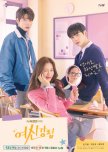
if inner beauty is the message, why are cosmetics front & center
A middle schooler, Im Ju Gyeong, is relentlessly bullied for her "ugly" looks until she discovers the power of cosmetics, changes schools, and enters a whole new world of social acceptance.While everyone loves a makeover, this drama brings to light the questions of the value of appearance and how far one will go to be on top of the social pedestal. As the mother of a teen girl, my interest lay in exactly what message this drama would convey and how.
IJG's family is ignorant of her suffering at school. Her mother is most worried about her grades, her younger brother mocks her for being "pancaked" and he himself falls for Han Go Woon, a girl who looks similar to his sister's natural self. HGW is an interesting character in that she represents an alternate version of IJG, similarly afflicted in appearance & bullied for it, but stronger in her self-confidence & clearer in her view of the role of beauty standards in society. She's a talented singer and accepts cosmetics only for the stage which is purely performative, and remains her natural self in daily life at school.
IJG, however, views her cosmetics as life saving medication as it hides her true self from her new classmates & friends. She fears the unbearable abuse of her former school will return if her new school discovers her secret. IJG's family watches her fluctuate between her two extreme realities but do little to address her problems. The drama became more of a comedy of double identities, along with the best friend love triangle, teen edition.
I wondered if the drama will end with IJG making a choice of how she wants to appear, or does she actually progress beyond that. Can this drama really make a statement about beauty standards when it's cast with idols? How about casting a FL who is more realistically plain-looking without exaggerating a leprotic skin condition? The makeover would actually be more dramatic. And her inability to stand up for herself then sets up the character's need for a man to save her. There's a line in the show which says if you have beauty then the only talent you need is kindness. All of the characters around IJG have some sort of talent regardless of their appearance, but all IJG seems to have is kindness. Perhaps that's what attracts the school "god" since he seems to have everything but kindness in his life. But this just means IJG only exists to fulfill another's need.
I fear a deeper message will be that cosmetics are the answer to every middle school girl's problems (and we know it's now hitting girls much younger). One of IJG's victories over her former tormentor is to beat her at her own game in an Instagram beauty contest. Instagram is now known for being a highly toxic medium for teen girls, but this isn't recognized in the show. IJG's obsession with makeup becomes her career aspiration. I'm trying not to think of that as a bad thing, but for IJG, cosmetics are a lifeline, rather than an art. Will IJG progress to becoming an artist? Will she own the cosmetics, or will the cosmetics continue to own her?
However, toward the end of the drama, most of these disturbing questions do get addressed. IJG makes a choice, but rather than being in a place of fear, she chooses from a place of confidence. Here's also where the adults she most depends on come through, and she also gains clarity in who her true friends are. Unfortunately, this transition lasts for only one episode and the character's personality remains rather flat. IJG isn't involved in any sports, clubs, or community service; is having a boyfriend the only solution to lack of opportunities?
Overall, this drama is very bingeable as I really wanted to see how things turned out for the main character. The early bullying scenes were quite cringeworthy but I waited to see what phoenix would arise from that mess. Unfortunately there were no surprises. Perhaps just rising up to "normal" is enough, but how does that give any inspiration? In the end, her highest achievement is to just be present for her friends but I don't think the story generated as much sympathy for her character as it could've.
Cet avis était-il utile?

Le mariage contracté par Park
1 personnes ont trouvé cette critique utile
entertaining, but confusing ending
Park Yeon Woo is a Joseon woman who finds herself suddenly in modern day Seoul after a botched murder attempt sends her through a time portal. The first person she meets is Kang Tae Ha, a young executive of a large retail corporation. Tae Ha not only looks exactly like the husband she had just married in Joseon & who passed away on their wedding night, he also carries the same name but doesn't recognize Yeon Woo. Gradually, she meets others in Tae Ha's circle who also look exactly like those who were around her in Joseon, including the vengeful mother-in-law.The story then falls, as the title suggests, into the contract marriage trope in a tale of repeating fates as Yeon Woo's "new Joseon" adventure parallels her previous Joseon life, including finding a profitable high end market for her embroidery & dressmaking skills. Past secrets gradually get revealed in a sordid tale of family betrayal all in the name of social status & greed.
In spite of the dark undertones the show was light & funny with a few LOL moments, but as the ending approached it got rather confusing . Yeon Woo is given a chance to change the course of her family history but her behavior didn't seem consistent with what I thought her character might do with a 2nd chance with her past love. The last episode also felt very glossed over, after a dragging previous episode which was basically an hour long good-bye scene, & a longer epilogue would've been nice. One important character, the mysterious spirit who catalyses Yeon Woo's time travel, is never really fully explained.
Finally, Lee Se Young as Yeon Woo showed more spunk & comic flare than she did in the early eps of Red Sleeve & remained strong throughout. Bae In Hyuk as Kang Tae Ha, is obviously more inexperienced with his performance. Veteran Jin Kyung as the mother-in-law deserves special mention with her portrayal of one of the more complex characters in the show.
Overall, an entertaining watch but too bad the ending fizzled out.
Cet avis était-il utile?

light & entertaining but lacklustre finish
Song Kang, the "Netflix King" for having so many shows exclusively on this network, shows his comic talents in this story of a demon, Jeoung GuWon, who takes advantage of despair & suffering to make deals with humans willing to trade their souls for relief. A master in the human world who is used to having absolute power, he meets by chance Do Do Hee, a workaholic CEO who proves to be his nemesis. DDH is played by Kim Yoo Jung (a veteran at age 24) who gives her character a refreshing hard nosed edge, with enough depth to reveal a lost & vulnerable soul within without turning her into a caricature.This show is infused with funny moments in spite of its very dark undertones. And although all the usual romance tropes are in play, somehow they're not annoying when you have SK to look at, & whose dramatic acting is actually decent. The storyline follows a largely predictable path but with smaller twists that aren't so obvious & keep things interesting. There's also the past lifetimes theme which is very popular in fantasy genres, showing how demons are born from pain & resentment, & tying the lead characters together over centuries. And, of course, no demon is complete without a demon hunter, but the character who I thought would be that, didn't become that. Questions of who or what constitutes evilness, whether the devil is in humanity or exists separately, are ever present. And, God is a woman, also of course, & one whom this demon serves.
In spite of the questions, Demon is not a deeply philosophical journey, but is entertaining and very binge-able until the rather lacklustre final episodes where innocents are redeemed & bad guys get their due.
Cet avis était-il utile?
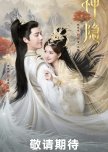
very lightly entertaining
I've followed Zhao LuSi for some time and she is on a lightning streak in her career. I never considered her particularly strong as a dramatic actress, but what she is good at are light comic roles, and the early part of this show suits her very well. Wang An Yu stands up well alongside ZLS's star power.Like other epics, this story spans vast stages of time but this show deals with much narrower issues. It begins with the imminent awakening a Fire Phoenix god, whose birth event is disrupted by GuJin, a true god who has yet to arise to his own destiny in the divine realm. He comes across a lowly spirit beast & together they start a journey to revitalize the Fire Phoenix.
I've read that The Last Immortal is a sequel to Ancient Love Poetry, a show I enjoyed very much, but there's not a lot of reference to it. TLI takes a long time to even start approaching the intensity of ALP. The tone changes from light comedy to serious half way through & here's where the leads' lack of depth in their performances become apparent. The story & action also drags noticeably before picking up once more as we enter the second act. However, rather than develop the characters' relationships more deeply, the show deals with all the villians rather early or too quickly, as with the long suppressed demon god. Too much time is spent with everyone firing their energy beams at each other while crying in angst in between. The ending felt somewhat unsatisfactory.
I don't have a lot to say about this show. It's lightly entertaining but the storyline doesn't hold any surprises, the CGI is bad, the costuming so-so, and no deep philosophical questions. It's good that ZLS could have a career in singing (she sings the opening theme song) if her acting doesn't carry her much farther, but this show won't stop her current streak.
Cet avis était-il utile?

fantastic ensemble cast
Best show I saw in 2022, & not just because the main character has the same last name as me. "A crime doesn't turn into a local custom just because everyone does it" (Ep13). In 2004 a wealthy village chief's son sexually assaults a bridesmaid at a villager's wedding, setting off a chain of events over the next 13 years, unravelling layers of misogyny, corruption, & oppression within not only the judicial system but among family members. The struggles between the individual & the collective is exacerbated in the migration from the village to the city & the march toward modernization. The story follows the bride in her relentless fight for justice for her family & their very own livelihoods. The ensemble cast is fantastic, portraying very complex & intersectional characters with sensitivity & grace.Cet avis était-il utile?

The Midnight Romance in Hagwon
1 personnes ont trouvé cette critique utile
Eye-opening but shot too dark to see
Is a teacher's purpose only for helping students pass exams? Not knowing what a hagwon is when I started this drama, I had homework to do. Why are school kids learning in an office building? isn't that setting usually for adult night classes? It took a few episodes just to get a sense of the role of hagwons, or private prep schools, within the public educational system. Teachers compete against each other for students while pandering to the parents, measuring success by how many get accepted to prestigious universities. It's a complex world of ultra-privilege & free market dynamics, intertwined with regular schooling like a cancer, choking out academic freedom & feuling incredible pressures for all involved.Speaking of night classes, this drama made me claustrophobic. Most of the scenes are visually dark: offices & rooms appear windowless, what windows were visible had their blinds drawn during the day, many outdoor scenes were nighttime, & classrooms & offices are so small all the occupants looked like they were virtually shoulder to shoulder. It made for a very oppressive setting. In fact, the overall look was so dark I actually had to adjust the brightness of my tv just to see what was going on (it's a cheap tv).
In spite of the show being uncomfortable to look at, the story itself was fascinating as it introduced an aspect of S Korean society I hadn't seen before, nor have I experienced anything close to that where I live. The story follows Seo Hye Jin (played by Jung Ryeo Won) a top performing teacher at a Daechi-dong academy. Her life is turned upside down when her former star student, Lee Jun Ho (played by Wi Ha Joon) quits a comfortable, nepotically achieved corporate job & is hired as a new teacher into her own team.
When you've been teaching for while, you discover it takes a student to challenge you to your roots. HyeJin unknowingly instilled in JunHo genuine wonder & curiosity in literature which was the spark to the improvement in his grades. But having been in the business for so long, HyeJin seems to have forgotten that focus, locked into her memorization techniques & dependency on her ability to predict exam questions that brought her to the top of her game. In stark contrast is JunHo's approach in encouraging exploration & appreciation. Catalyzing their explosive clash is a brilliant 10th grade student Lee Si Wu, who is in the top tier of smart: i.e. he actually knows what he doesn't know. Si Wu fully understands his perfect scores are like walking blindfolded on a tightrope, totally dependent on knowing which questions to study for, rather than being able to handle any question that could come his way. He knows how to memorize, but doesn't know how to read. JunHo wants to teach students to read, a skill for a lifetime, which would bring a seismic shift to the role of the academy as an economic machine, catering only to parents' wishes.
The influence of hagwons is so deep they affect real estate, & this is reflected in Jun Ho's pursuit of becoming successful enough to buy his own home. In spite of growing up privileged in Gangnam, he's determined to achieve his own living & stay in Gangnam. Stronger than his own economic ambition, however, is his pursuit of the true purpose of education & his own role as a teacher.
At the center of it all is JunHo & HyeJin's noona relationship, one in which HyeJin has a very hard time overcoming the teacher/student mindset. And, given her own hesitancy & inexperience, she's paradoxically mature & immature at the same time. JunHo challenges her on different levels &, in this respect, I felt this was one of the more realistically presented age gap romances I've seen. Things get ugly when ambitious executives at the school seek to use this relationship to destroy HyeJin's career. This somehow made me lose interest in the show in it's final episodes as it plunged downward into viscious office politicking.
The subject of hagwons has been eye-opening & for that reason I enjoyed the story which is the show's greatest strength, along with good performances from the cast. Unfortunately, the show was also visually suffocating with all the poorly lit interior & night time settings, & with a lower res tv I sometimes couldn't even see the actors' faces clearly. If you can get beyond that, this drama was well worth the watch for an honest examination of the purpose of education itself.
Cet avis était-il utile?
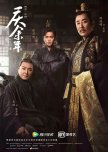
worth the rewatch; ready for S2
I first saw this show 2 years ago, when I first started watching Chinese dramas. At that time, I felt that it was one of the better shows I've seen in any language. Today, over 150 shows later, & about half of them costume dramas, I'm realizing Joy of Life S1 is probably one of the best shows I've seen in the last 3 years.This production has a very different feel to it from the regular diet of C-dramas. The dialogue is fast, smart, & funny, & the acting is superb. Few shows are able to create & sustain so much tension, with enough comic moments expertly executed to move the story along. Each character evolves with each scene as new information changes the way we see them, but rather than make everything dizzying or confusing, the story itself gradually comes to light. It's a complex puzzle but each move is closely examined. Deftly intertwined within the policital arc is the romantic development between the main character & his royally approved betrothed.
The story gets deeper as each character tries to outsmart the other, & it becomes a challenge to remember who knows what, like trying to keep several moves ahead of all players in a huge game of chess. Alliances form & change on the fly. But this is what kept me engaged in the story, moving along with Fan Xian as he discovers the secrets of his own identity, & as he grows from a sequestered village boy into the possible heir to the 2 (& possibly 3) most powerful organizations in the capital.
It's a story that's not about good vs evil, but about motivations. It's about the struggle for power while staying true to your principles & loyalites, or not. No character is one sided. Uncle Wu Zhu, the blind swordsman, has to be one of the coolest, badass characters of any martial arts show around. Invisible as a shadow, unmatched & unrecognized in his skill. He, too, has a secret forgotten past.
The story is so complex that I'm glad I decided to rewatch S1 in preparation for S2. I've picked up more details & gained a better understanding of all the characters, & even developed a new theory about Uncle Wu from all the clues I totally missed on 1st viewing, like when FanXian asks him in one scene, "Are you human?" I'm now ready for S2.
Cet avis était-il utile?

The Story of Pearl Girl
0 personnes ont trouvé cette critique utile
too long & unsatisfactory
I'm starting to lose patience with these big, high production shows that prove to be nothing more than celebrity vehicles. So much so that I'll not bother with a detailed critique. If I have to sit through 40 episodes I'm going to have expectations. A long show calls for complexity and depth, and while Pearl Girl has the backdrop for these elements, the show itself basically doesn't rise much above this: a single arc of a love triangle, introduced early, following the 3 characters as they run into each other from town to town. The main couple discovers their briefly touched upon pasts are intertwined as they both get caught up in a whirlwind of revenge and the show then devolves into an endless bloodbath. By the half way point, I suddenly realize there's no real 2nd or 3rd F/M leads or arcs. The only significant secondary arc follows the embattled cross-dressing daugther of a competing merchant family, who is a villainous opponent but unfortunately not that smart. In the 2nd half of the show the ML who was so dominant in the beginning then takes a head-scratching back seat to the FL, until he literally fades away. Sloppy editing left loose ends as well.I think Zhao Lusi's career has been so much on fire for the last 2 years, to the point where I feel she is now over exposed. Her acting skill is limited, as is Liu YuNing's, and it's not interesting to watch them try to fulfill the same roles, the same way, over and over.
In looking back overall, the show had some entertaining moments but I basically sat through to the finish only out of curiousity for the ending.
Cet avis était-il utile?

Visually flashy, but obsessed with death
I don't remember much from the first American TV production of Shogun (1980), so I'm only able to re-watch scenes on YouTube for comparison. Interestingly one scene, Blackthorne explaining his understanding of the world map to Toranaga, is recreated almost word for word in the latest production by Disney+.The remake gives a very different feel as there is unexpected weight given to the Japanese characters, especially that of struggling feudal Lord Toranaga. Much of the dialogue is in Japanese and even the episode titles are bilingual. This is perhaps an attempt to give the show an authentic Asian drama presentation, but there's something that's still very American in its tone. So much attention was paid to authentic visual detail, but I think the forest ended up getting lost in the trees.
I grew up watching North American TV, but spending the last 3 years watching Asian (C/K/J) productions has given me a new view of cinematic storytelling. There are stark differences but it took me a while to figure out exactly how to describe it in one word, but I thought of it: gratuitous. North American audiences are so obsessed with gore that they need to see the heads flying for the sake of seeing heads flying. Not to mention sex without love; there's no meaning attached. How does that flying head affect the person making or watching it happen? (Compare the execution of Ned Stark in Game of Thrones for an emotional beheading). The show thus became an endless parade of suicide & killing in the most gruesome manner, every single episode. Death is something each character is resigned to on daily basis & sex is just something you do like going to the gym; it's no wonder everyone is miserably hopeless. Was is truly the zeitgeist of Japanese feudal society?
The setting is stunning considering how every structure is a replica. Unfortunately I felt a lot of the beauty was lost in the very dark lighting of so many scenes, all in shades of grey & blue. This is made worse with a lower res tv. Why film in the dark, other than to emphasize the very dreary atmosphere with the constant threat of death under every stone. Mud, mist, & rain are prominent. Every scene is cold, wet, muddy & bloody.
Equally monotone are the personalities of all the characters. A very narrow range of emotion makes the show seem to present a stereotypical portrait of Japanese people as serious, stoic, humourless, and inscrutable. Any expression of joy is muted against the background of rain & darkness. I realized I couldn't sympathize with any of the characters. Where's the base human emotion that connects us all? One episode is titled "Eight Fold Fence", describing the wall behind which a person hides their inner selves for protection from a chaotic outer world. This just means everyone is so withdrawn that even viewers can't connect. How can one sypmathize & be drawn into any character's story in this way? The only thing left to be interested in was the political intrigue, which is simply a history lesson.
With the politics being a final note, this series ends on a cliff hanger, ready for a season 2, as this first season was basically a huge build up for a war that has yet to happen. Making the characters more human would be a big improvement for the next season. Otherwise I'd have to say this show was a not an elevation from a typical flashy American show. Rated 7.5 for the production.
Cet avis était-il utile?




